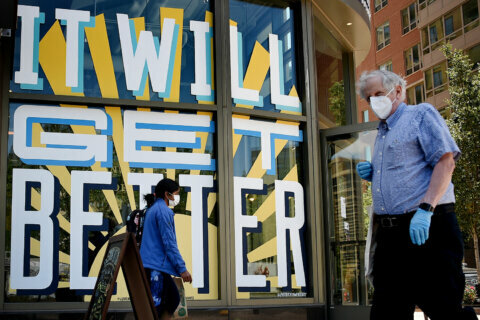During a briefing on Monday night, Maryland Gov. Larry Hogan said he would like residents of his state who are over 60 years old to stay home in order to limit their chances of being exposed to coronavirus.
That’s because once exposed to any respiratory illness, including the more standard influenza, those in that age group have a greater risk of developing serious complications. That’s why so many older people are at risk if they do contract COVID-19.
Dr. Stuart Turkewitz, a geriatrician with Maryland Geriatric Medicine in Greenbelt, said it’s not so much that younger people won’t feel the effects of the virus, it’s that they have greater lung capacity, so they’d be better able to manage their daily tasks.
“An illness that knocks out a certain amount of lung function in a 30-year-old may not cause that person much difficulty,” he said.
But, Turkewitz said, as we age, we lose a little bit of lung capacity all the time. So, by the time we reach 60, “the consequences once having had any illness are more severe. You just have less lung reserve to deal with the problem.”
- DC area responds to several new confirmed coronavirus cases
- Coronavirus tips: Use common sense, don’t panic over DC-area cases
- Coronavirus test results in DC, Maryland and Virginia
- Coronavirus FAQ: What you need to know
- Closings and delays
There’s no significant difference between someone who is in his or her late 50s and someone who is 60. Turkewitz also mentioned that everyone is unique — there’s no such thing as a typical 60-year-old or a typical 80-year-old.
“Everybody loses at a slightly different rate,” he said. “Nothing really magic happens on the day you turn 60.”
But, as you get into your 60s, if your lung function is compromised due to any sort of respiratory problem, you won’t have as much in reserve as a younger person would. That’s why coronavirus is so dangerous in that age group.
“A 60- or 70-year-old, who has lost quite a bit of lung function, especially if that person is a cigarette smoker or has asthma or COPD (chronic obstructive pulmonary disease), is not going to be able to [work, climb stairs and walk] as easily, and may even be short of breath at rest,” Turkewitz said.
That’s why, he said, it makes sense for those in an at-risk age group, or those who are younger but have reduced lung capacity, to be extremely vigilant during the coronavirus outbreak. That includes people who use ventilators, who have reduced heart function or a compromised immune system.
“There’s a lot we don’t really know about the virus,” Turkewitz said. “We don’t know how easy it is to catch from going out. It’s presumed that it’s widely spread in the community, even now. Avoiding crowds would be a good idea for those who are older or compromised.”









